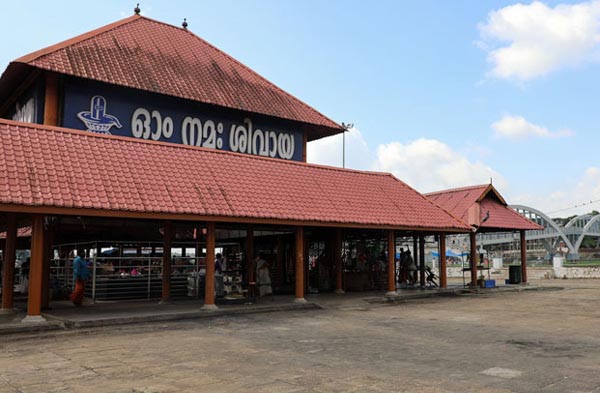Sree Mahadeva Temple (Shiva Temple)

Information of Sree Mahadeva Temple (Shiva Temple), Aluva, Ernakulam, Kerala
Aluva Shiva Temple is a river bank Hindu temple famous for Thithi, Tharpan or Divas of the deceased persons. It is beautifully situated on the river banks of Periyar, which is also called as the Dhakshina Ganges of Kerala. This temple has a record of more than 10 lakhs visitors yearly. The important occasion of Karutha Vavu pulls many kerlaites to do the special rituals for the deceased. This occasion comes in the monsoon season and on this special day the rain won't be there in this areas and the river will be silent to perform the rites for the deceased. This is also a tourist spot since this is the largest river sand banks with an area of 150 acres alongside this river making it a unique Periyar Ghats. The Shiva Temple built here is also known as the Aluva Shiva Temple, Thiruvairanikkulam Mahadeva Temple and Manapuram Shiva Temple. It is divinely located on the Periyar River banks near Aluva Town, Ernakulum District of Kerala State.
Sree Mahadeva Temple (Shiva Temple) Religious Significance
The word Shiva itself means the Dead. Literally the word Shivam is a Sanskrit word equivalent to Shavam or the Dead. Hence he is the lord for the deceased peoples as per Hindu beliefs. The Karkada Vavu or the new moon day of the August month is an important day here. The shivarathri is also an important day to perform the special rituals for the deceased, where their relative of the deceased peoples flows away the Pinda's after performing a ceremony with a priest alongside the River Ghats of Periyar and flows away the Pinda into this holy river. In Hindi it is called as Tharpan karma. This kind of Tharpan's are performed yearly and on this occasion lakhs of Hindu peoples come and perform this rituals here. Apart from the Tharpan's this temple is also visited daily by its locals and tourist whoever coming to Cochin City.
Sree Mahadeva Temple (Shiva Temple) Mythology & History
The rivers are the elixir to life for the Hindus. It is believed that the life was originated nearby these rivers and a person death is also honored along these rivers as praying for the soul of deceased persons. The Manapuram is known since 250 BC. It was a ritual place since the ancient times. Since the Hindu's always associate with Lord Shiva for the deceased one. The Tharpanam, Bali and Pinda Dhan rituals are undergone since the ancient times and it is followed till now by the Hindus residing in Kerala State.
Sree Mahadeva Temple (Shiva Temple) Architectural Significance
The word Manapuram means the river sand. This is such fine river sand banks spread across the stretch of Periyar River in the Aluva or Alway Town. It totally covers 150 acres of land on this river bank. A traditional temple is found here on these fine sands. This is a Kerala style temple which abodes the Lord Shiva. There is also a porch and a Shiva life size sculpture nearby this river. There is a fine Ghats built along the river banks to perform rituals for the Hindu peoples. This temple can be seen from all directions as a landmark of this holy river. In the monsoon rains this temple will be looking very divine with partial submerged on river and rain waters. This kind of natural incidence brings new fine sands every year prior to its festival times.
Festival at Sree Mahadeva Temple (Shiva Temple)
The Manapuram Shivarathri is the main festival here. This is the day where lakhs of people take pilgrimage from various parts of Kerala State. On this special occasion the Periyar River Ghats and river plains are throng with Hindu peoples. This day is specially cared by the temple Board along with the local police, fire service and the municipal bodies to happen this festival smoothly without any mishaps by crowding. This is followed by a month long fair which is visited by many foreign tourists here. This is a festival of lights, exhibition, amusement games and adventures are conducted by skilled peoples. The entire festival celebrate here is celebrated in a grand way, which enhance the importance of the temple as well as the cultural and the religious value of the place and the temple.
- Andhra Pradesh Temples
- Assam Temples
- Bihar Temples
- New Delhi Temples
- Goa Temples
- Gujarat Temples
- Jammu and Kashmir Temples
- Karnataka Temples
- Kerala Temples
- Madhya Pradesh Temples
- Maharashtra Temples
- Odisha Temples
- Punjab Temples
- Rajasthan Temples
- Sikkim Temples
- Tamil Nadu Temples
- Telangana Temples
- Uttar Pradesh Temples
- Uttarakhand Temples
- West Bengal Temples